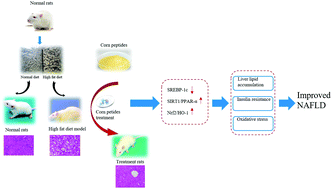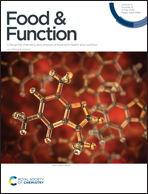Corn peptides improved obesity-induced non-alcoholic fatty liver disease through relieving lipid metabolism, insulin resistance and oxidative stress†
Abstract
Non-alcoholic fatty liver disease (NAFLD) is increasingly threatening human health. The remarkable effects of corn peptides (CPs) as bioactive peptides on liver protection have attracted much attention. Nevertheless, the specific effect of CPs on NAFLD remains unclear. The present study was designed to investigate the efficacy of CPs in the prevention and auxiliary treatment of high-fat diet (HFD)-induced NAFLD in SD rats, and puerarin was used as the positive control. SD rats were fed a high-fat diet to establish the NAFLD rat model, and LO2 cells were treated with a high concentration of fructose to simulate the NAFLD cell model. NAFLD was comprehensively examined in terms of body weight, liver function markers, serum biochemistry and liver histology. Protein expression was determined using western blot analysis. The results of animal experiments showed that CPs could effectively inhibit the rate of weight gain, reduce the blood lipid level and liver index, and enhance glucose tolerance. The results of cell experiments showed that CPs could effectively reduce the accumulation of lipids in LO2 cells and inhibit the accumulation of reactive oxygen species (ROS). In addition, CPs could markedly reduce liver lipid accumulation in the liver cell and liver tissue, as further evidenced by the reduced expression of SREBP-1c in human non-tumour hepatic (LO2) cells. Meanwhile, the increased expression of SIRT1/PPAR-α and Nrf2/HO-1 pathways under the pretreatment of CPs in LO2 cells indicated that CPs could markedly relieve high fat-induced fatty liver injury, regulate insulin sensitivity, and reduce production of ROS. The results of in vivo and in vitro experiments demonstrated that CPs provided potential prevention and auxiliary treatment for NAFLD through reducing lipid accumulation, alleviating insulin resistance, and inhibiting oxidative stress. This study investigated the biological activity of CPs and laid the theoretical basis for the development of CP-based functional foods and dietary supplements.



 Please wait while we load your content...
Please wait while we load your content...